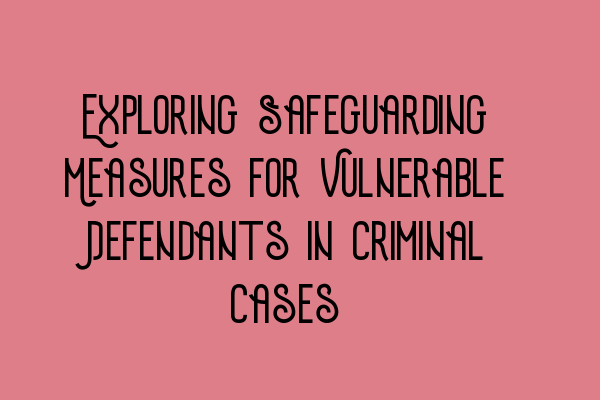Exploring Safeguarding Measures for Vulnerable Defendants in Criminal Cases
Vulnerable defendants in criminal cases require special attention and safeguarding measures to ensure that their rights are protected during the legal process. These defendants may include individuals with mental health challenges, learning disabilities, or any other condition that affects their ability to fully participate in their own defense. It is essential for the criminal justice system to provide adequate support and accommodations to guarantee a fair trial for all defendants.
The Importance of Safeguarding Measures
Vulnerable defendants often face multiple hurdles in the criminal justice system. They may struggle to understand complex legal concepts, communicate effectively, or cope with the emotional and psychological challenges associated with criminal proceedings. Without appropriate safeguards, these defendants may be at a significant disadvantage, compromising their ability to exercise their rights and receive a fair trial.
To protect vulnerable defendants, various safeguarding measures have been implemented within the criminal justice system. These measures are designed to ensure that defendants have access to justice, receive fair treatment, and can participate fully in their defense. Let’s explore some of the key safeguarding measures:
1. Legal Representation
One crucial safeguarding measure for vulnerable defendants is the provision of legal representation. Adequate legal representation ensures that defendants have the necessary support and guidance throughout the legal process. It allows them to understand their rights, make informed decisions, and effectively communicate their position to the court.
It is essential for vulnerable defendants to have access to solicitors who specialize in criminal law and have experience working with vulnerable individuals. These solicitors can provide the necessary expertise and support to navigate the legal process effectively.
Related Article: SQE 1 Practice Exam Questions
2. Assessing Fitness to Plead
Assessing the fitness to plead is another important safeguarding measure for vulnerable defendants. The court must determine if a defendant has the mental capacity to understand the charges against them, instruct their legal team, and participate in their defense. If a defendant is deemed unfit to plead, the court must take appropriate steps to safeguard their rights and ensure a fair trial.
This assessment may involve the appointment of an independent expert, such as a psychiatrist or psychologist, to evaluate the defendant’s mental capacity. The findings of this assessment are instrumental in determining the appropriate course of action and support for the defendant.
Related Article: SQE 1 Practice Mocks FLK1 FLK2
3. Special Measures in Court
Vulnerable defendants may require special measures in court to enable them to fully participate in their defense. These measures aim to address any communication or accessibility barriers faced by the defendant. Some common special measures include:
- Allowing the defendant to give evidence via video link.
- Ensuring the defendant’s face is not visible to the courtroom.
- Using intermediaries to assist with communication.
- Adapting court facilities to accommodate physical disabilities.
The objective of these special measures is to create a supportive environment for vulnerable defendants, removing any unnecessary obstacles that may hinder their ability to understand and participate effectively in the proceedings.
Related Article: SQE 2 Preparation Courses
4. Support and Accommodation
Vulnerable defendants often require support and accommodation tailored to their specific needs during the legal process. This may include access to interpreters, support workers, or mental health professionals who can assist them in understanding and navigating the proceedings.
In some cases, vulnerable defendants may benefit from pre-trial therapy or counseling to help them cope with the emotional and psychological challenges associated with the criminal proceedings. Providing such support can empower defendants and ensure they are better equipped to actively engage in their defense.
Related Article: SQE 1 Preparation Courses
Conclusion
Implementing safeguarding measures for vulnerable defendants in criminal cases is of utmost importance to uphold the principles of justice and fairness. By providing legal representation, assessing fitness to plead, offering special measures in court, and providing necessary support and accommodation, the criminal justice system can ensure that vulnerable defendants are not disadvantaged and have access to a fair trial.
If you want to learn more about the SQE Criminal Law & Practice in the UK, SQE 1 and SQE 2 preparation courses, or SRA SQE exam dates, visit our related articles:
- SQE 1 Practice Exam Questions
- SQE 1 Practice Mocks FLK1 FLK2
- SQE 2 Preparation Courses
- SQE 1 Preparation Courses
- SRA SQE Exam Dates
